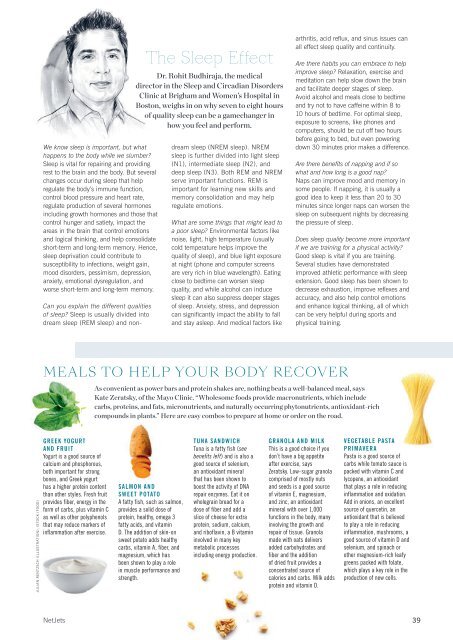Create successful ePaper yourself
Turn your PDF publications into a flip-book with our unique Google optimized e-Paper software.
We know sleep is important, but what<br />
happens to the body while we slumber?<br />
Sleep is vital for repairing and providing<br />
rest to the brain and the body. But several<br />
changes occur during sleep that help<br />
regulate the body’s immune function,<br />
control blood pressure and heart rate,<br />
regulate production of several hormones<br />
including growth hormones and those that<br />
control hunger and satiety, impact the<br />
areas in the brain that control emotions<br />
and logical thinking, and help consolidate<br />
short-term and long-term memory. Hence,<br />
sleep deprivation could contribute to<br />
susceptibility to infections, weight gain,<br />
mood disorders, pessimism, depression,<br />
anxiety, emotional dysregulation, and<br />
worse short-term and long-term memory.<br />
The Sleep Effect<br />
Dr. Rohit Budhiraja, the medical<br />
director in the Sleep and Circadian Disorders<br />
Clinic at Brigham and Women’s Hospital in<br />
Boston, weighs in on why seven to eight hours<br />
of quality sleep can be a gamechanger in<br />
how you feel and perform.<br />
Can you explain the different qualities<br />
of sleep? Sleep is usually divided into<br />
dream sleep (REM sleep) and nondream<br />
sleep (NREM sleep). NREM<br />
sleep is further divided into light sleep<br />
(N1), intermediate sleep (N2), and<br />
deep sleep (N3). Both REM and NREM<br />
serve important functions. REM is<br />
important for learning new skills and<br />
memory consolidation and may help<br />
regulate emotions.<br />
What are some things that might lead to<br />
a poor sleep? Environmental factors like<br />
noise, light, high temperature (usually<br />
cold temperature helps improve the<br />
quality of sleep), and blue light exposure<br />
at night (phone and computer screens<br />
are very rich in blue wavelength). Eating<br />
close to bedtime can worsen sleep<br />
quality, and while alcohol can induce<br />
sleep it can also suppress deeper stages<br />
of sleep. Anxiety, stress, and depression<br />
can signifi cantly impact the ability to fall<br />
and stay asleep. And medical factors like<br />
arthritis, acid refl ux, and sinus issues can<br />
all effect sleep quality and continuity.<br />
Are there habits you can embrace to help<br />
improve sleep? Relaxation, exercise and<br />
meditation can help slow down the brain<br />
and facilitate deeper stages of sleep.<br />
Avoid alcohol and meals close to bedtime<br />
and try not to have caffeine within 8 to<br />
10 hours of bedtime. For optimal sleep,<br />
exposure to screens, like phones and<br />
computers, should be cut off two hours<br />
before going to bed, but even powering<br />
down 30 minutes prior makes a difference.<br />
Are there benefits of napping and if so<br />
what and how long is a good nap?<br />
Naps can improve mood and memory in<br />
some people. If napping, it is usually a<br />
good idea to keep it less than 20 to 30<br />
minutes since longer naps can worsen the<br />
sleep on subsequent nights by decreasing<br />
the pressure of sleep.<br />
Does sleep quality become more important<br />
if we are training for a physical activity?<br />
Good sleep is vital if you are training.<br />
Several studies have demonstrated<br />
improved athletic performance with sleep<br />
extension. Good sleep has been shown to<br />
decrease exhaustion, improve refl exes and<br />
accuracy, and also help control emotions<br />
and enhance logical thinking, all of which<br />
can be very helpful during sports and<br />
physical training.<br />
MEALS TO HELP YOUR BODY RECOVER<br />
As convenient as power bars and protein shakes are, nothing beats a well-balanced meal, says<br />
Kate Zeratsky, of the Mayo Clinic. “Wholesome foods provide macronutrients, which include<br />
carbs, proteins, and fats, micronutrients, and naturally occurring phytonutrients, antioxidant-rich<br />
compounds in plants.” Here are easy combos to prepare at home or order on the road.<br />
JULIAN RENTZSCH (ILL<strong>US</strong>TRATION), ISTOCK (FOOD)<br />
GREEK YOGURT<br />
AND FRUIT<br />
Yogurt is a good source of<br />
calcium and phosphorous,<br />
both important for strong<br />
bones, and Greek yogurt<br />
has a higher protein content<br />
than other styles. Fresh fruit<br />
provides fiber, energy in the<br />
form of carbs, plus vitamin C<br />
as well as other polyphenols<br />
that may reduce markers of<br />
inflammation after exercise.<br />
SALMON AND<br />
SWEET POTATO<br />
A fatty fish, such as salmon,<br />
provides a solid dose of<br />
protein, healthy, omega 3<br />
fatty acids, and vitamin<br />
D. The addition of skin-on<br />
sweet potato adds healthy<br />
carbs, vitamin A, fiber, and<br />
magnesium, which has<br />
been shown to play a role<br />
in muscle performance and<br />
strength.<br />
TUNA SANDWICH<br />
Tuna is a fatty fish (see<br />
benefits left) and is also a<br />
good source of selenium,<br />
an antioxidant mineral<br />
that has been shown to<br />
boost the activity of DNA<br />
repair enzymes. Eat it on<br />
wholegrain bread for a<br />
dose of fiber and add a<br />
slice of cheese for extra<br />
protein, sodium, calcium,<br />
and riboflavin, a B vitamin<br />
involved in many key<br />
metabolic processes<br />
including energy production.<br />
GRANOLA AND MILK<br />
This is a good choice if you<br />
don’t have a big appetite<br />
after exercise, says<br />
Zeratsky. Low-sugar granola<br />
comprised of mostly nuts<br />
and seeds is a good source<br />
of vitamin E, magnesium,<br />
and zinc, an antioxidant<br />
mineral with over 1,000<br />
functions in the body, many<br />
involving the growth and<br />
repair of tissue. Granola<br />
made with oats delivers<br />
added carbohydrates and<br />
fiber and the addition<br />
of dried fruit provides a<br />
concentrated source of<br />
calories and carbs. Milk adds<br />
protein and vitamin D.<br />
VEGETABLE PASTA<br />
PRIMAVERA<br />
Pasta is a good source of<br />
carbs while tomato sauce is<br />
packed with vitamin C and<br />
lycopene, an antioxidant<br />
that plays a role in reducing<br />
inflammation and oxidation.<br />
Add in onions, an excellent<br />
source of quercetin, an<br />
antioxidant that is believed<br />
to play a role in reducing<br />
inflammation, mushrooms, a<br />
good source of vitamin D and<br />
selenium, and spinach or<br />
other magnesium-rich leafy<br />
greens packed with folate,<br />
which plays a key role in the<br />
production of new cells.<br />
NetJets<br />
39


















